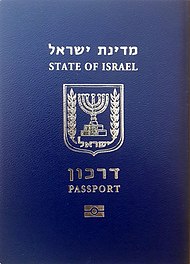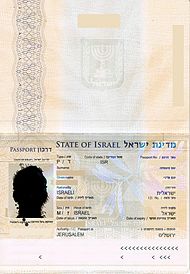Israeli passport
| Israeli passport דרכון ישראלי | |
|---|---|

The front cover of a contemporary Israeli biometric passport issued since 2013.
|
|

Front personal-information page of an Israeli biometric passport.
|
|
| Issued by |
|
| Type of document | Passport |
| Purpose | Identification |
| Eligibility requirements | Israeli citizenship |
| Expiration | 10 years after issuance |
| Cost |
₪280 (adult) ₪140 (child) |
The Israeli passport (Hebrew: דרכון darkon) is a travel document issued to Israeli citizens to enable them to travel outside of Israel, and entitles the bearer to the protection of Israel's consular officials overseas.
According to the February 2016 Visa Restrictions Index, Israeli citizens can visit 147 countries and territories visa-free or with visa on arrival, ranking the Israeli passport 25th in the world.
Israeli citizens are allowed to hold passports of other countries, but are required to use the Israeli passport when entering and leaving Israel. This regulation was introduced officially in 2002, after having been legally contested on several occasions.
Israeli passports began to be issued in 1948, after the Israeli Declaration of Independence on May 14, 1948, and used Hebrew and French texts. At first they were not defined as a passport but as a travel document, this changed in 1952 when Israel began to introduce the first travel document as a passport, they began to be issued late that year. The first travel document was issued to Golda Meir, who at the time worked for the Jewish Agency and was soon to become Israel's ambassador to the USSR.
The first Israeli passports bore the limitation: "Valid to any country except Germany". An Israeli citizen who wished to visit Germany had to ask that the words "except Germany" be deleted from their passport. This was done manually by drawing a line through these words. After the signing of the Reparations Agreement between Israel and West Germany in 1952, the limitation was withdrawn and passports became "valid to all countries".
On 30 March 1980, new regulations issued by the Minister of the Interior required Israeli passports to use Hebrew and English, instead of Hebrew and French. Subsequently, French texts were replaced by English texts.
...
Wikipedia
